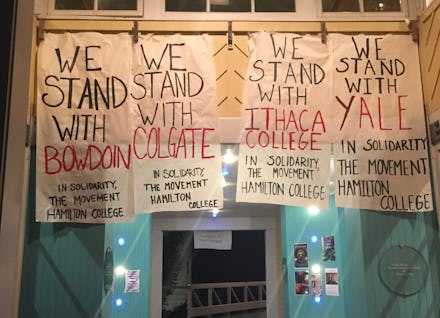Hamilton College Students Present Administration With 39 Minority-Related Demands

Call it the new college try.
Joining the ranks of college students across the country fed up with their school's inaction on campus race issues, a Hamilton College student group called "The Movement" sent a list of demands to their president on Tuesday.
Among the demands called for by the group at the Clinton, New York campus are an increase for faculty of color, an emphasis on the admission and recruitment of students of color, improve resources for LGBTQ students, ban the anonymous commenting app Yik Yak and hire a president of color to succeed current president Joan Hinde Stewart, who is slated to retire in June.
Reads the document's preamble:
"We, the Students of Hamilton College, demand the end of the inevitable tokenization of all marginalized bodies at Hamilton College. Hamilton College cannot continue to overwhelmingly perpetuate narratives that center whiteness, able-bodied individuals, colonization, heteronormativity, and cisnormativity. The faculty, administration, staff, and student body at Hamilton College almost ubiquitously encompass a single population that continues the exclusion of historically underrepresented communities.
The group maintains the anonymity of its members, but on their Tumblr they state that they aim to "to serve as advocates and partners with other students who feel equally marginalized on the Hamilton College campus."
While The Movement's demands are an appeal for a more equitable campus, some see their activism as symptomatic of campus cultures encouraging censorship and hypersensitivity. According to the Daily Beast, a main goal of the organization is to limit freedom of speech. Studies show millennials are more likely to support censoring offensive comments regarding minorities, but students insist the tensions at Hamilton are more complicated than that.
"If someone says that they are in pain, I think it is wrong to dismiss that," 2012 Hamilton alumna Danielle Burby told Mic. She added that during her time at Hamilton, she saw similar racial tensions come to the fore, recalling the time a fraternity hosted a "Mexican-themed" party that was met with student protest.
"I disagree with the people who criticize campus culture for being hypersensitive," said Burby. "Yes, I think that college is designed to push you and make you uncomfortable in certain ways, but I also think that we need to acknowledge the structural power imbalances at play."
Anthony Jackson, a former student body president, wanted to cut Hamilton some slack. "While I understand the root of many of the demands, they seem to lack a consideration of some ongoing and past efforts made by the college," he said. "The college has certainly made strides when it comes to the recruitment and retention of students of color. Can we do more? Of course! And I hope that the current campus and national climate inspires bold action."
Hamilton was originally an all-boys' school until it was combined with what Burby called a "very liberal and forward-thinking" women's college in the late '70s.
"There's always that push and pull at Hamilton between the more socially conscious and the more traditionally minded," she added. "They definitely clash sometimes ... I will say that whenever Hamilton's administration has done something that was very forward-thinking ... the conservative media has latched on and given Hamilton a hard time."
President Stewart hasn't released a public statement, but on Wednesday the college published a summary of recent events under the title "Hamilton Student Group Joins National Conversation," in which they said that conversations are ongoing.
The document commends Stewart's dedication to campus diversity, citing her launch of need-blind admission and the creation of programs designed to support students of color, who comprise 23% of Hamilton's student body.
Jackson said that as the Hamilton community moves forward, it's important to remember these questions of race are not issues confined to college campuses. "This is not indicative of a unique Hamilton problem," he told Mic. "Rather, it is a symptom of our nation's history and dominant culture. "